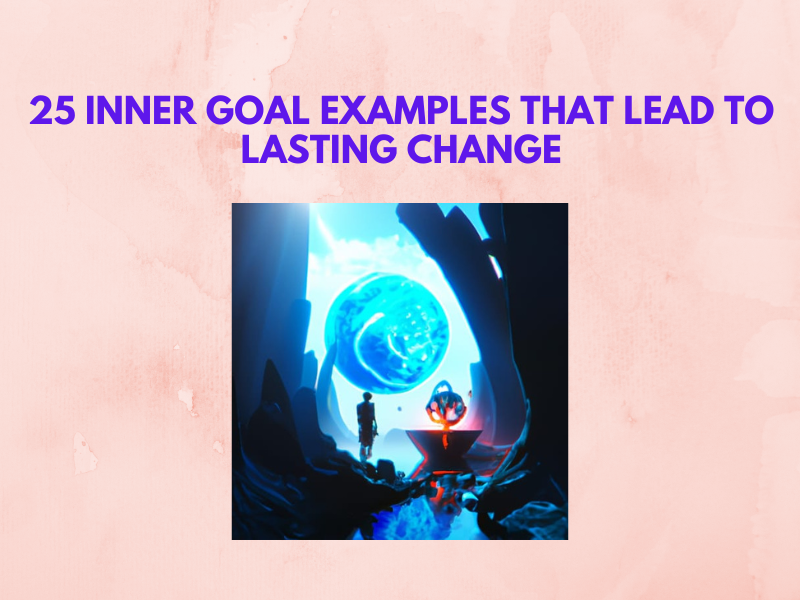When it comes to achieving our goals, we often think of a big, hairy, audacious goal (BHAGs). But what about the smaller goals that can lead to those longer ones? This blog post will discuss 25 Inner Goal Examples That Can Lead to Lasting Change.
These small goals you can set for yourself daily or weekly and help you move closer to your larger goals. So without further ado, let’s get started.
What are Inner Goals? , and Why Should You Set Them?
A person who wants to improve their personality and develop strong self-awareness and self-confidence should focus on developing inner goals.
Usually, these types of goals are related to your emotions, self-esteem, feelings, mantle state, spirituality, and so on. And setting up inner goals means working to improve these inner things inside you.
Everybody (who wants to achieve something) has some goals in mind. Still, the problem is, in various cases, people are not aware of generating some inner sense inside them.
However, inner goals are incredibly helpful in achieving big goals. And in other words, learning about advancing or improving your inner feelings, such as getting higher self-esteem, building a strong personality, developing positive thinking and mindset, understanding self-feelings, managing stress, controlling negative emotions, etc.

Additionally, inner goals are just like objectives we set to rebuild ourselves. It gives a purposeful life; by following inner goals, anybody can stay motivated in every situation.
People, who tend to learn more about themselves, are well-managed, successful, and innovative because they are greatly aware of their true potential.
Once you know your goals, it becomes clear where to go, how to drive through the journey, and clear decision-making.
The 25 Inner Goal Examples Are
Practice paying daily gratitude for whatever you have in the present and have in the past.
Give yourself considerable time to understand your inner feelings and evaluate your behaviors in different situations and your regular thoughts.
Work on enhancing your public speaking skills.
Build self-confidence-boosting skills.
Learn to manage stress. (For this, meditation and yoga are essentially helpful)
Develop yourself as an active listener. (it will improve your emotional intelligence)
Take really good care of yourself. ( regular exercise, healthy food intake, and enough sleep is the top example of caring for yourself)
Read more, learn more strategy. (books are always good friends that always increase knowledge, intelligence, and skills)
Stay engaged in learning new skills with your formal education (the hobby to challenge your mind make you smarter and more innovative)
Stay present-minded on the current situation.
Create and maintain a healthy work-life balance, and feel fulfilled
Accept failure but with a positive attitude.
Learn from mistakes and develop a growth mindset.
Practice forgiving others, and yourself, too.
Never stop being a student; you can take classes, workshops, and training at any stage.
Set financial goals and achieve them; it helps the future to maintain financial stability.
Enhance your time management skills (It will increase your productivity).
Learn to limit benefits, such as limiting the boundaries with others.
Practice a polite, assertive, and effective way of communication.
Learn to control showing off your sudden emotions and always try to express them assertively.
Working hard to set values and integrity.
Develop a daily creative practice to nurture the inner self.
Set different destinies, visit wonderful locations, learn new cultures, and understand different people in other countries.
Try to feel joy and have peace of mind in different scenarios.
Do love and kind acts for no condition and no expectation.
What Is the Inner And Outer Goal?
If you need clarification while understanding the inner and outer goals, then take it like two sides of the coin. Both are equally essential but different processes.
Inner Goals
The inner goal is something in which you need to focus on personal growth, such as self-discovery, self-confidence, inner improvement, and so on.
Learning new skills, developing new but good habits, breaking your bad habits, creating a strong bond with yourself, and understanding and taking care of your mantle stability and emotions.
All help in developing a better version of yourself. inner goals help you become more confident, self-aware, realistic resilient.
Outer Goals
On the other hand, outer goals are all about external achievements, like climbing the corporate ladder, reaching specific social status, achieving financial success, etc.
To accomplish the outer goal, you need hard work to do, extreme dedication, and a prominent plan of action to accomplish outer goals.
They are focused on attaining a certain level of recognition and success.
But both inner and outer goals are crucial for developing a fully rounded and best version of lifestyle.
When setting up inner goals helps develop your skills and abilities, the outer goal caters to you in achieving external success.
The combined action of both inner and outer goals creates a balance that leads to true joy, happiness, and accomplishment.
Just like a ship, which needs both its sail and anchor to navigate through the sea, we need both outer goals and inner goals to navigate life and feel fulfilled.
How To Go About Setting Your Own Inner Goals
Embarking on the journey of self-identification can be a daunting task, but establishing inner goals is a powerful tool that serves as a compass to guide us toward our desire and what we want to become.
Whether to become more confident or improve your mental well-being, these goals serve as a beacon of hope in the distance.
When you are thinking to go about setting your own inner goals, you have to take a moment to reflect on your deepest desires.
At that time, you have to be specific and realistic when setting your inner goals. It means you have to map out the steps you need to take to achieve those specific goals.
In this journey, you will need support from your life partner, loved ones, friends, books, classes, and even a therapist who will guide you through the road of change ahead.

As you progress toward your inner goals, don’t forget to check in with yourself and evaluate your progress. And if you find yourself struggling, don’t take time to make adjustments along the way to make achieving your inner goals a fluid process.
Finally, when you reach your destination, take a pose and celebrate that moment; give yourself a reward and credit for the progress that you have made.
Remember, inner goals are your journey, so be very kind, realistic, and compassionate with yourself every single mile of the way.
The only exception is that there are no limits to what you can achieve when setting goals.
What Are The 3 Inner Goals?
Now we know the inner goal and how they pursue personal development.
These inner goals comprise three major inner goals; intellectual development, physically good health, and spiritual growth.
Physical Health
Physical health and body may be perceived as external goals, but they hold a deeper significance than improving one’s appearance.
Marcus Aurelius was a proponent of the Stoic school of thought. He strongly emphasizes maintaining one’s physical health to stay healthy and pursue other personal objectives.
It’s not about vanity or immortality but rather about being able to live a fulfilling life. A strong and healthy body is the foundation upon which all other goals can be built.

As Aurelius said, “The body is a servant, not a master.” By caring for our physically good health, we can better serve ourselves and those around us.
Example 1: I will exercise regularly to make myself stronger and more energetic.
Example 2: I won’t eat junk food to reach my flat tummy goals.
Intellectual Development
A lifelong journey toward knowledge and self-improvement necessitates focusing on intellectual growth, hobby cultivation, and the right goals.
The mind stretched by a new experience can never return to its old dimensions, as Marcus Aurelius stated in his Meditations.
To expand your mind and deepen your understanding of the world, look to traditional methods such as reading, taking classes, and attending conferences.
But pay attention to the power of hobbies as well. Whether painting, writing poetry, bird-watching, or establishing your own business, these pursuits can tap into your innate creativity and help you develop your critical thinking skills.

According to Marcus Aurelius, different individuals, each with distinctive characteristics and skills, can serve as illustrative examples of the power of intellectual development.
These people represent the ideal of lifelong learning and self-improvement, from the philosopher who seeks wisdom to the athlete who tests their physical limits.
So embrace your interests and passions and let them direct your path to a more intellectually fulfilling life.
Example 1: I read more books with my formal education to learn more by reading different experiences.
Example 2: I will take classes and training to polish my skills.
Spiritual Growth
spiritual growth is another more significant journey to be enlightened. It is a path that results in self-realization and a deeper comprehension of one’s position in the world.
Pursuing spiritual growth is essential to one’s overall development, whether going through a particular religion or a personal meditation journey.
Marcus Aurelius was a stoic who recognized the value of restraint and discipline. He understood that these qualities were crucial for both spiritual and personal development.

He observed and admired people who exhibited these traits and realized how important they were for developing a deeper understanding of oneself and the touring world.
Spiritual goal setting provides a sense of accomplishment in your inner world.
Example 1: I will spend a part of my savings on charity
Example 2: I will participate in social work to provide others with a better lifestyle.
Some Personal Inner Goal Examples from the study of Marcus Aurelius
Take reasonable care of your body.
Explore every aspect of decision-making.
Always delving deeper to uncover the truth for your inner peace.
Be intimate with Philosophy.
Improve self-confidence
Develop emotional intelligence
Boost your confidence.
Increase emotional quotient and fortitude.
Improve relationships and self-awareness.
Boost the general level of quality of life.
Demonstrate gratitude and inner peace.
Create self-control.
Develop self-control.
Encourage a growth mentality.
Develop wisdom, and feel fulfilled.
Develop empathy through practicing mindfulness.
Increasing self-compassion.
Enhance your communication.
Self-motivation.
Abilities develop morality.
Encourage a feeling of mission.
Develop humility.
Become more assertive in every matter.
Enhance your time management abilities and flexibility.
Be more patient no matter what happens.
Develop your sense of humor.
Become more self-aware.
Benefits Of Having Inner Goals
there are a lot of benefits to having inner goals. Such as:
Improve safe awareness
Create personal values
Promote personal growth
Enhance self-confidence
Develop a skill-oriented attitude during goal setting
Give life a purpose or a direction
Build resilience to cope with stress
Goal setting should Provide a sense of accomplishment in every matter
Enhance satisfaction
In short, inner goals lead to overall improvement. Such as Inner goals can also help individuals improve relationships and overall quality of life.
Tips For Achieving Your Inner Goals
Knowing the tips to attain these goals is also crucial now that you know inner goals examples well.

Here are some proven tips that help to achieve inner goals.
Clearly define what you want to achieve.
Make time bounded, measurable, and specific goal-setting.
Create a daily plan of action to achieve your goals.
Work on goal prioritization so that you can focus on top priority.
Evaluate your progress.
Seek support and encouragement from your life partner, friends, family, and other supporters.
Keep yourself motivated by visualizing the result.
Refrain from being afraid to adjust your goal in every matter where you feel right.
Celebrate your success.
Reflect on your progress and learn from your experiences.
Importance of Self-Compassion And Self-Care When Pursuing Inner Goals
Remembering the value of self-compassion and self-care is the best for inner goals examples of when one sets out to achieve their inner objectives are crucial.
These activities serve as the cornerstone of one’s path toward personal development. The path to reaching inner objectives can be difficult and fraught with traps without self-compassion and self-care.
Fail strategies and setbacks may quickly lead to discouragement and overwhelming feelings.
But one may develop a positive and encouraging mentality and accept that failure is a normal part of learning and growing if they embrace self-compassion and self-care.
Regular self-compassion and self-care activities, whether through meditation, writing, or exercise, help to maintain physical and mental well-being, motivation, and energy levels.
In this way, self-compassion and self-care provide the support necessary to achieve inner goals.
What Is Personal Goal and How to Set Personal Goals?
Personal objectives and goals are a compass to direct us on our path through life. We set goals for ourselves and the dreams we hope will come true.
They might be little, like picking up a new language, or significant, like seeing the entire planet as inner goals examples.
Setting personal objectives gives us a sense of purpose and direction, which keeps us motivated and focused while we work to achieve them.
They might be the key to unleashing our full potential and the stepping stones to a better future.
Here are some tips that can help you set up personal goals :
Identify what you want and be realistic when setting your goals.
Setting personal goals in simple steps.
Break down your long-term or big goal into manageable and small steps.
Decide a deadline to accomplish your personal goals.
Recognize obstacles and make plans to overcome them.
Write down your personal goals.
Share it with your well-wisher.
Evaluate your achievements regularly and update your plan timely.
Stay positive to achieve long-term goals.
Don’t forget to reward yourself for all your hard work!
Way to Find Work-life Balance
Finding a work-life balance can be challenging, but several strategies can help!
One very effective trick is setting clear boundaries between work and personal time. Setting a specific time for work and specific time for yourself, such as spending time in the gym with your loved ones, doing things you like the most, and your hobbies.
Another strategy is to prioritize your work and make an effective plan. It will allow you to focus on the most important task and then delegate work or outsource less important tasks.
However, getting time for self-care and relaxation will help you lower stress, open up an innovative mind and enhance overall well-being.
Another thing that you should consider is must evaluate your current job career goal and working according to your abilities to find something that aligns with your values and interests.
Finding a work-life balance is a personal and ongoing process that may require experimentation and flexibility.
3 Common Examples of Personal Goals, The Needs They Satisfy, and Value Conflicts
Personal goals are those specific goals and targets that you set for own to achieve. Here are some examples of their need and value conflict. Such as:
Career Advancement
we set personal goals to make us financially stable and achieve a sense of accomplishment.
But it also leads to value conflicts such as sacrificing time with your family, neglecting your hobbies, etc.
Weight Loss
this type of personal goal improves your physical health, gives you self-confidence, and enhances your self-esteem, but its value conflict is you will start extra focusing on your body image and stick with only perfection.
Relationship Development
These personal goals are to maintain strong bonds and connections with those you like. But conflict is you must compromise your values and neglect your self-care.
Personal objectives or personal goals are crucial to shaping your personality, but it’s more crucial to be conscious of any potential value conflicts that might arise while achieving them.
What are External Goals?
Goals related to external elements, such as a person’s work, education, or wealth, are referred to as external goals.
These objectives frequently center on reaching a certain result or position in the outside world, such as receiving a promotion, purchasing a home, or opening a company.
They might be an immediate or long-term goal and frequently call for particular activities or alterations to be successful.
A few examples of external ambitions include getting a degree, purchasing a home, launching a business, getting a promotion, or attaining a specified salary level.
Final Thoughts On Personal Goals
ultimately this has to be said that setting personal goals are a powerful tool that is extremely helpful in achieving success. It helps improve physical health, expand knowledge, and make you highly skilled. Additionally, it grows spirituality.
Anyhow, setting specific goals which are also measurable and actionable to focus on special efforts. But you have to stay calm and motivated to achieve your desired outcomes.

But keep in mind one thing; all personal goals are not developed equally. You have set the grade of importance and values.
In addition, self-compassion and self-care are crucial when working toward our objectives since they promote a supportive and upbeat perspective.
We may construct a full, contented, and meaningful life by creating and achieving personal objectives.
Wrapping Up
It must be admitted that self-identification and personal growth have no end. But always come up with a clear vision.
It is possible to see how to accomplish inner objectives with focus and commitment.
After knowing a lot more about inner goal examples, you can set goals to discover yourself, and your deeper desires and passion can embark on fulfilling your brighter future.
So Be courageous and unafraid to reach for the stars as you embark on your journey to uncover your greatest dreams and interests by following the inner goals examples.
The only real limitations are those you impose on yourself; therefore, have confidence in your ability.
Accept the strength of ambition and allow it to direct you toward a better and more rewarding future.



